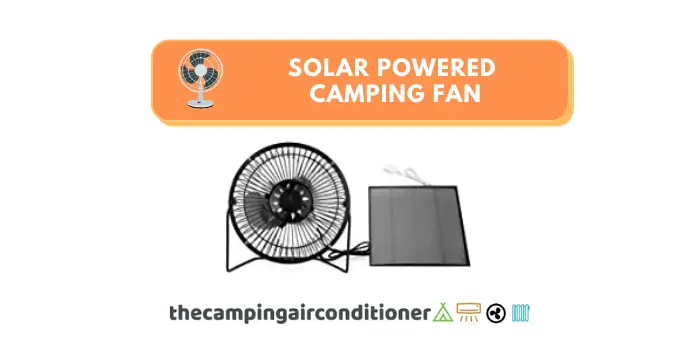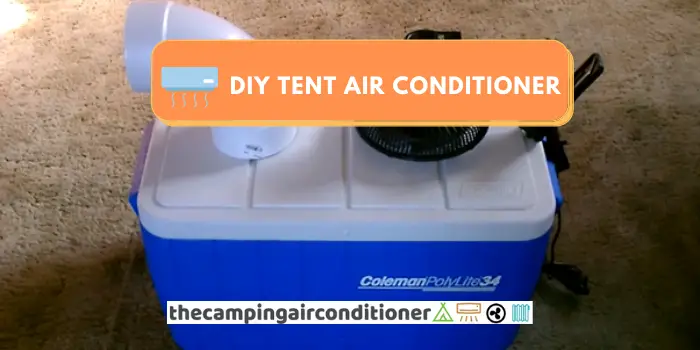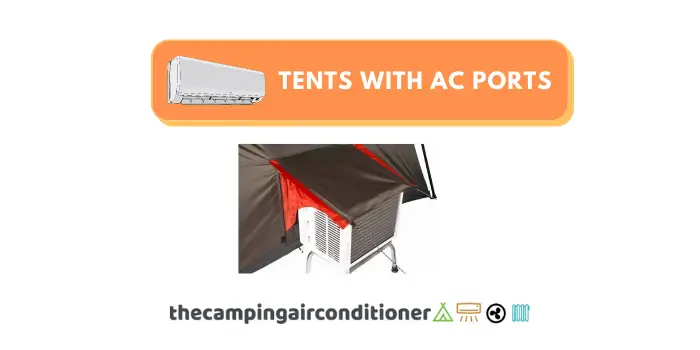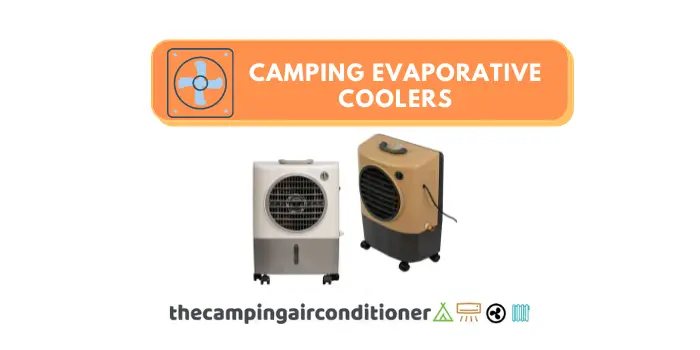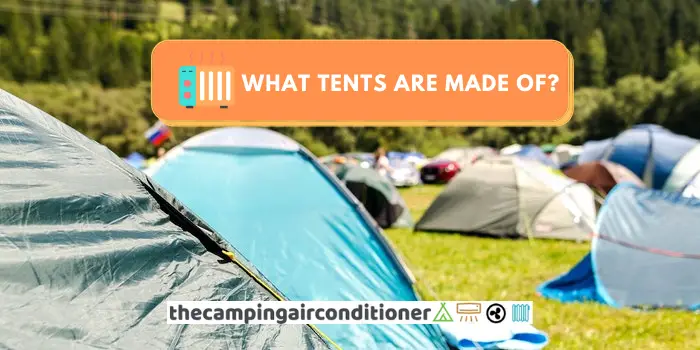Summer camping is a great way to enjoy the outdoors, get some fresh air, and spend time with family and friends. However, things can get uncomfortable in a hot tent when the temperatures start to rise.
But with a few simple tips, you can stay relaxed and comfortable while enjoying nature’s majesty. So, how to cool a tent without electricity? These tricks will help you beat the heat:
- Choose the adequate tent fabric
- Choose the best location to pitch your tent
- Set your tent up at the right time
- Use battery and solar-powered devices
- Use a reflective blanket
- Cool your body down
- Watch for tent ventilation
- Forget about your sleeping bag
- Build a DIY Air Conditioner
Let’s investigate into detail each tips below.
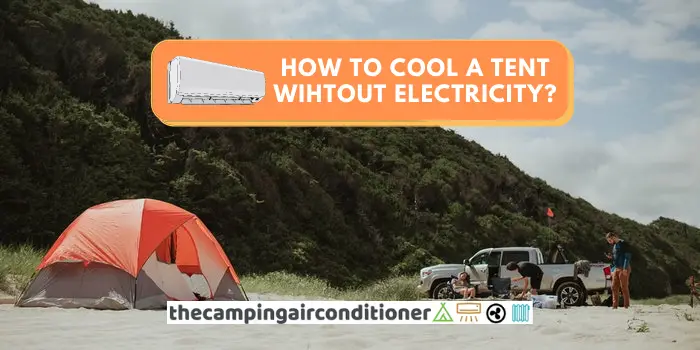
How do tents get too hot?
There are two major sources of heat that can lead to high temperatures inside a tent:
a) Sunlight – if the tent is exposed to sunlight for long hours, there is no doubt that you will find a stuffy environment inside it. There are simple ways to get around this, which are detailed below.
b) The human body – This is a little bit obvious, but the more people you have inside a tent, the hotter it will get.
How to cool your tent without electricity?
Tip 1 - Choose right type of tent
The type of tent you choose is the primary variable to cool down a tent. Always consider the tent shape, fabric, color, and size because these factors determine how cool a tent can be.
Camping tents are made from many materials, including nylon, polyester, cotton/canvas, poly-cotton, cuben fiber, pvc-coated, and others. Each material will have its own characteristics, which will heavily influence its ability to manage hot weather conditions.
For example, tents made of polyester are lightweight, easier to handle (transport and assemble), and come with high durability levels. Waterproofness is another feature of this kind of tent.
The polyester is heavily sealed, blocking the water outside. However, this can also lead to water condensation inside the tent and lead to higher temperatures. Nylon tents are very similar to polyester ones but are usually lighter (and sometimes more expensive).
Consider getting a tent made of canvas since it prevents heat penetration and has improved breathability. The drawback of canvas tents is their weight – usually, they are heavy and suitable for car camping.
These days, canvas tents have been broadly used in luxury camping/glamping. There are different sizes – we recommend these models for 2-3 people and 8+ campers.
Canvas tent
If you want to chose something in the middle range that offers both flexibility and temperature control, pick a poly-cotton tent. They are made of both polyester and cotton in different proportions and carry the benefits of each material.
Black is the ultimate heat absorber.... White is the opposite. White light is the sum of all wavelengths, so when some people view a white object, they are really viewing all visible light hitting the object's surface and reflecting back. Some heat is still absorbed based on the nature of the object's material, but minimal additional heat is absorbed, making white the coolest possible color
For shape and size, consider getting a lightweight or large tent. It will offer more headroom and constant airflow.
Tip 2 - Pay attention to your camping location
Planning is the key to success! Before booking your trip, undertake thorough research of your camping area. Preferably, pick a location with enough shades.
The best area to camp is close to hills, trees, rivers, and lakeside. For instance, camping in a hilly or forest-rich location will give you enough sunlight protection. Take advantage of the shade provided by the trees and protect the tent from direct sunlight.
Furthermore, the windier the area is, the more air will circulate in your tent. Try to choose a camping site with adequate wind and ventilation. For instance, camping close to waterfalls and riversides is a good idea.
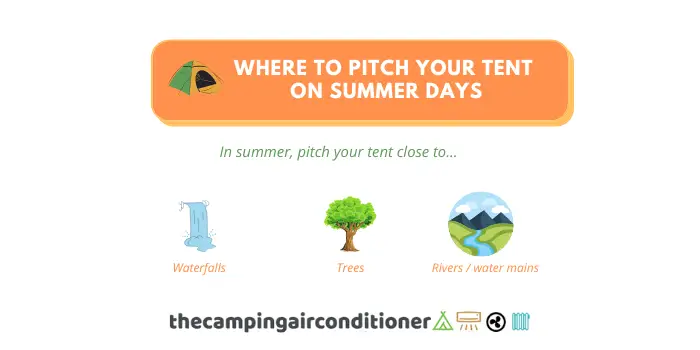
Tip 3 - Set up your tent at the right time
Again, planning is the key to success. Pitch your tent close to sunset time, which means that it will be exposed to less sunlight during the day.
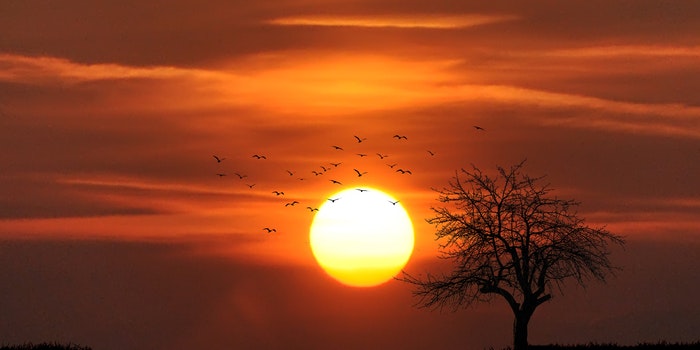
If you have arrived at the camping location early in the morning, explore the campsite and other activities around. Do not set your tent right away if you are not using it. A tent that sits under the sun the whole day will trap hot air inside.
Tip 4 - Purchase battery-powered devices
Sometimes, you need a non-electric device to cool your tent when scorching hot.
There are battery-powered fans that can cool both small and large tents without draining the charge faster among the devices. However, because you need comfort, the fan should operate quietly. You can invest either in a handheld fan for personal use or a larger fan for cooling the entire tent.
We recommend using a battery-powered tent air conditioner. There are many benefits you can get from a battery-powered AC, such as portability, easy installation, and lack of electric hookups.
Other articles that might interest you
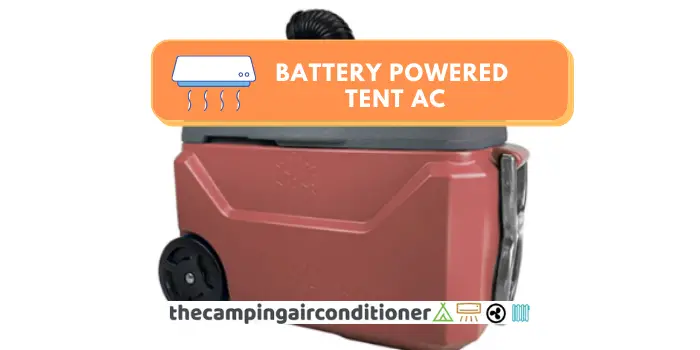
Battery powered tent air conditioners – Best options in the market
Tip 5 - Buy a Reflective Space Blanket and insulate the tent all-around
Covering a tent with a space blanket might look weird, but it helps reflect the heat. When you set your tent in open areas without shades, the sunlight will hit the tent directly.
The hot air might get trapped inside your tent unless you leave enough ventilation. Placing a reflective space blanket on the tent might help avoid this issue.
The blanket must cover the whole tent for the trick to work. Make sure that you point the reflective side up. A space blanket is a cheap trick, and it will protect your tent from overheating – You can buy the options below for less than $25 bucks!
Our recommendation - reflective tarps
Furthermore, put the tent on top of something to reduce heat absorption from the ground. The ground is one factor that makes tents uncomfortable at night. So, add something like a tent footprint or a tarp to enhance your camping experience.
Tip 6 - Cool your body down
Other than nature, your own body can be one factor that causes your tent to overheat. Here are some tips that reduce your body temperature, according to Medical News Today:
- Drink cold liquids
- Go somewhere with cooler air
- Get in cool water
- Apply cold to critical points on the body (wrists, neck, chest, and temples)
- Move less
- Wear lighter, more breathing clothing
Tip 7 - Watch for your tent ventilation
The easiest way to cool your tent is to ensure it is well-ventilated. Keeping the tent open will allow for maximum airflow.
When a tent is unzipped or opened, the heat reduces, and the tent maintains its coolness. Open it during the day or when you are around the campsite – make sure you read our tips around tent security, though.
Tip 8 - Forget about your sleeping bag
It is not advisable to use a sleeping bag since you are camping in hot weather. Their primary role is to keep you warm, making it unsuitable for summer camping.
A good idea would be using an inflatable mattress instead of sleeping bags. They are easy to carry and lightweight, being ideal for camping adventures.
Our budget-friendly recommendation for inflatable mattress
Tip 9 - Create your own DIY Air Conditioner
Yes, you can create an air conditioner with a few items, such as:
- An ice chest / cooler box (or Styrofoam icebox)
- A PVC elbow – 90 degrees
- A small fan (solar-powered)
We have detailed all the steps required to build this cooling device in this post. It is pretty easy and convenient – you can create with 5 steps!
Suggested Article
Conclusion
Sometimes, camping in the summer heat might seem a terrible idea. However, if you follow these tips and bring a couple of devices, it can become one of the most unforgettable experiences you can have.
We have hand-picked these tips to provide you with effective, cheap, and practical tricks to improve your summer camping experience.
All of them are simple and affordable to put in place. So, why not give them a try?
Happy camping!


